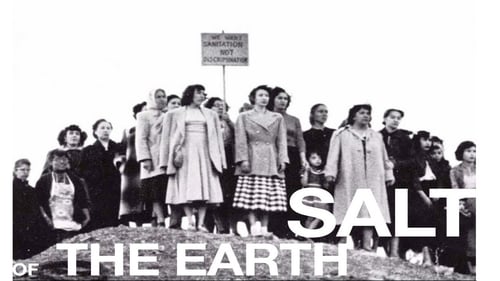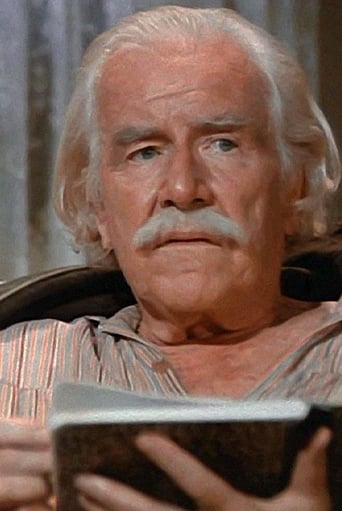Hottoceame
The Age of Commercialism
Moustroll
Good movie but grossly overrated
Zlatica
One of the worst ways to make a cult movie is to set out to make a cult movie.
Justina
The film never slows down or bores, plunging from one harrowing sequence to the next.
runamokprods
If a bit awkward and rough edged in form, a bit on the nose in it's politics, and a bit melodramatic in it's telling, this is an historically important early 'independent' film. Made by artists largely blacklisted from Hollywood for liberal beliefs, and/or for refusing to testify against others, this was the only film in America's history that was itself blacklisted, and kept out of theaters despite positive reviews. Yet what it preached; basic dignity and rights for Hispanics, for women, and for workers could hardly be seen, even then, as a real threat to America -- had it not been for hysteria towards all things liberal, progressive, or intellectual –- those things being lumped in with communist revolutionary activity. It's remarkable for a 1954 film to see an American film with all the leading roles being Hispanic, and played by Hispanics, not white actors in 'brown face'. Even more impressive is the film's early but potent feminist viewpoint. The issue of women also adds a nice level of complexity to a story that could have felt too simplistic in terms of right and wrong. The male Hispanic workers are almost as guilty of oppressing their wives as the Anglo bosses are of oppressing their Hispanic workers. So there's an acknowledgment that everyone still had a lot to learn about creating an equal society in those days. Along with the occasionally awkward acting (most of the cast were non-professionals) and occasionally too blatant speech-making, there are some very moving, human and inspiring moments. And in a nice twist of fate, after being blacklisted from theaters and kept from the public, the film now resides on the national registry of important films.
coreymoquin
The Salt of the Earth, which came out in 1954 paints an almost too real picture of how migrant workers were treated before the civil rights movement. It is easy to see why the United States government, which was going through "The Red Scare" during this time, blacklisted this film. The film touches on and provokes many issues that were very sensitive during this era. Issues such as racism, equality, and feminism are the key themes in the movie. Racism was still very apparent in the United States during the 1950's, namely because the civil rights movement had not happened yet. The film pits the whites or "Anglos" against the Mexican workers. However, not all the whites in the film are depicted as evil. There are a few Caucasian workers who side themselves with the Mexicans. This gives the film a much more "real" atmosphere to it because it doesn't allude to one race being good and the other evil. Instead of simply having the whites be the antagonist, the film sets the leader of the mining company up to be the antagonist. Despite having a few whites on the side of the Mexican workers the film clearly sympathizes with the Mexicans. The film controls the in a way so the audience will undoubtedly root with the workers. The Mexican workers have poor safety requirements, which constantly lead to accidents on the site. This is all so the company can save money. When the Mexicans complain of this they are threatened with being replaced with an American worker by the foreman. The film does a good job of painting the leaders of the mining company as evil. There is a scene in the beginning where the foreman tells the workers to get back to work right after one of the workers is nearly killed in an explosion. This shows that the leaders have no compassion for the workers and that they are only in the business for the money with no care of the well being of the Mexicans. Also, the scene where they capture Ramon Quintero and beat him is very powerful and really makes you sympathize with that character. Another issue the film tries to push is feminism. The film starts off early with the Mexican workers acting very sexist toward their wives. Ramon is very controlling of his wife, Esperanza. There is an early scene where Ramon tells Esperanza to stop crying and wasting her time listening to the radio. This scene alone sets up the fact that sexism is an issue in this town. Another scene that depicts this fact is when all the women are trying to convince Esperanza to take part in a picket line. One of the wives complains that she works very hard and is still treated as though she is useless by her husband. However, once the men are not allowed to take part in the picket line the women become very involved. The men begin to understand that the wives can help with the strike. The film came out in 1954. The United States was in a false sense of calm during this time. The economy was booming. This lead to the growth of materialism and the country was becoming vastly capitalist. With the exception of the cold war and the communist scare the country was going through a very calm time. Salt of the Earth acts as a sort of a wake up call. It pushes all of these unseen issues to the light so people can become aware that there are still injustices going on inside the country. The main point of the film is equality. The film's conflict is a struggle for the races and sexes to become equal in the eyes of the government. Salt of the Earth was clearly ahead of it's time.
MartinHafer
This film was produced by the United Mine Workers union. Apparently, it's the only American film to be blacklisted and was made by many blacklisted folks. It's amazing, really, as the film is NOT pro-communist (at least not overtly) and has to do with problems people of all political persuasions would agree are wrong. While this might have been controversial in its day, today the film just seems very inspiring and well worth seeing."Salt of the Earth" is set in the small town of San Marcos—a community in New Mexico inhabited by Hispanic-Americans who work in the mine--and is based on an actual strike. It's very unusual in that it's told more from the point of view of the workers' wives—and it's narrated by her ('Esperanza'--Rosaura Revueltas). Much of film is in Spanish but enough is in English that viewers should have no trouble understanding.The film focuses on a group of workers who have had enough—particularly in regard to serious safety problems in the mines. In addition, company stores, poor sanitation and general discrimination against Hispanics all resulted in this walkout strike. Once this strike began, it became obvious that the police were in the pockets of the owners and were used as instruments to try to intimidate and break up the union. In particular, the beating of Ramon and birth of child is very compelling scene that illustrates this alliance.After many months, the strike has continued and the women begin to assert themselves. While the husbands are very traditional and sexist, the women begin demanding better sanitation and even begin to walk the picket lines once the men are court-ordered to stop picketing. Will these folks be able to wait out the mine owners? The film is an incredibly sensitive and compelling film that humanizes the workers and familiarizes the viewer with their plight. I was not surprised to see Will Geer in a role as the sheriff, as he had a long history of union and leftist politics—this is not a criticism—just an observation. Overall, an incredibly well-made film considering that it mostly uses normal folks and not actors. It also is one of the most pro-feminist films of the era--and very compelling throughout. Well worth seeing...and this is coming from a guy who politically is relatively far to the right on many issues. A great portrait of some very brave Americans.
cstotlar-1
The film itself is a "cause celebre" Just imagine ... a movie blacklisted by a fascist government, made by wrongly convicted geniuses, am overt reference to world Communism...what's not to love? Frankly, I'm not aware of any outstanding works by any of the collaborators. Their works ranged from "adequate" to "mediocre" or even worse. If it had anything to say at the time, it seems quite commonplace today. The test of any true work of art is the test of time and this one has aged quite badly.It is an historical comment, nothing more, and actually it's rather boring and irrelevant to today's audience.Curtis Stotlar







